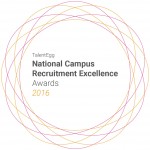This article was originally published on HR Reporter
Aislin Roth experienced a whirlwind day in a CEO’s shoes in February. The 21-year-old commerce student at Queen’s University in Kingston, Ont., worked alongside Caroline Riseboro, president and CEO of Plan International Canada, a children’s rights advocate organization in Toronto.
The partnership was part of CEOx1Day, a program organized by executive search firm Odgers Berndtson Canada that paired 18 CEOs with students from universities and colleges across the country. “The value of the experience comes as the CEO earns an opportunity to pass strategy by the next generation, while the student has access to the process of running a major organization,” said Jacqueline Foley, chief marketing officer at Odgers Berndtson Canada in Toronto. “The connections that happen between the students and the CEOs are quite significant and some stay in touch,” she said.
“The CEOs just really enjoy that opportunity to spend a day with these really bright, motivated students and, of course, the students get all kinds of benefits out of the day, as well. They’ve got lots of skills and lots of potential and lots of ambition, but that day with the CEO allows them to really see what leadership is all about.”
One-on-one time
Roth’s day included one-on-one time with Riseboro, an opportunity to participate in an executive management team meeting, and a local event called “Equal Voice” promoting the election of more female politicians. The executive meeting was a highlight for Roth.
“It was great to get to see — at such a high level — how they’re thinking about the organization’s strategic objectives three years out, five years out, what the long-term vision is, and how at a high level, the strategy all fits together,” she said.
Plan International’s youth engagement and marketing teams solicited Roth’s opinions in terms of her typical interactions with non-profit organizations. “I tried to bring a fresh, outsider’s perspective of someone who doesn’t necessarily know a lot about Plan International,” she said. “Real-life experience as a young female in male-dominated workplaces fuelled her contribution to the discussions,” said Roth. “It’s been an incredible experience,” she said. “It’s given me a lot more respect for some of the challenges leaders face, and the things that motivate them to come into work every day.
Riseboro shared advice on managing differing opinions, the importance of showing concern for personal well-being and work-life balance, as well as strategies to better prioritize work objectives. “A key takeaway has been ‘How do you make sure you’re spending your time on the things that help the organization the most?’” said Roth. “As a CEO, you have so many people asking for your time.”
Insights for leaders
Now in its sixth year, the CEOx1Day program is meant to provide insights into current business environments for both current and future leaders, said Foley. “Companies today are really looking to engage their employees more, and connect to the future — the high potentials, the next generation — and keep them engaged.” Knowing Roth wanted to connect the dots between learned theory and real-life business activity, Plan International worked hard to create opportunities where she could meaningfully engage in discussion, said Riseboro. “We were really purposeful to have Aislin be part of our executive management team and feed into the discussion and give us advice on some of the topics that we were covering.”
Riseboro appreciated getting a sense of where the next generation of leaders find value. “We are trying to solve century-old problems of poverty and gender inequality, and we want to attract the best and brightest minds like Aislin and others,” she said. “Plan’s mission is really trying to advance children’s rights and equality for girls. It’s so important to expose young women to CEO roles and leadership roles. Because often what we find is that young girls actually perceive that they have fewer opportunities because of their gender.”
“While her eventual career remains unknown, a leadership position is on the radar”, said Roth. Ideally, she’d like to join a team with international scope that is intellectually curious and includes participants from diverse backgrounds.
Gen Z arrives
For the first time, participating organizations in CEOx1Day welcomed gen Z participants — age 21 and under.
Mary Barroll, president of TalentEgg, an employment agency in Toronto that supports CEOx1Day, comments on this. “The priorities of generation Z are unlike those of its predecessors,” she said. “It has a great deal to do with the fact that they were raised in the shadow of a recession — a very different time than when many millennials were raised… growing up in a booming economy where there were endless opportunities.” “Gen Z workers respond best to employers that care less about the bottom line and more about making a positive impact on society via meaningful employee experiences”, said Barroll. They are expected to stay in their first job longer, looking for skills development over and above compensation. Unlike millennials, it’s less about flextime and more about experience, skills development and direct contact with supervisors, she said.
“Their attitudes towards work are quite different in terms of job security,” said Barroll. “Allowing them an opportunity to see how they could progress, and giving them guidance about what steps to take in order to succeed… is really important.” Alongside consistent stimulation and learning, an inclusive culture with a focus on corporate social responsibility is very important to gen Z workers, she said. Employers may need to revamp recruitment and benefit practices to adapt to the influx of these workers, said Barroll. “Organizations should highlight their commitment to their core values — as reflected by their corporate social responsibility initiatives — and develop volunteer programs that build deeper relationships with young talent.” “A lot of that has been addressed in some big organizations,” she said. “Many others have not… adapted to the new reality and are still utilizing things that used to work in the past. And they’re really challenged when they’re in a competitive environment for top talent — positioning themselves in the best light possible — because they haven’t understood that the values of young people today are quite different than those were 20 years ago.”
Differing motivations or not, ambition, curiosity, resilience and the ability to inspire will continue to be core leadership skills — both today and tomorrow, said Jacqueline Foley, chief marketing officer at Odgers Berndtson Canada, the organization behind CEOx1Day.
“The skills that make leaders successful today are still very much the skills that we see in these future leaders.”






Leave a Reply
You must be logged in to post a comment.